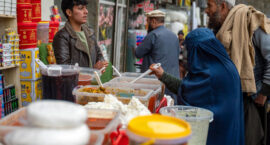The U.S. withdrew from Afghanistan in August 2021, leaving the Taliban as the de facto authorities. Since then, the Taliban has issued hundreds of repressive decrees designed to systematically oppress and marginalize Afghan women and girls, from denying them education, to restricting their movement.
Ms. sat down with Dr. Lauryn Oates, executive director of Canadian Women for Women in Afghanistan, a nonprofit organization that supports Afghan women and girls by investing in basic education, literacy and technology for education; providing grants and scholarships and other financial support; and engaging in policy advocacy to restore Afghan women and girls’ fundamental human rights and dignity.
“The Taliban’s treatment of women is a threat to women everywhere. Other groups are taking note that the Taliban is getting away with these restrictions, that it can literally strip women and girls of all rights and there’s no consequences.”












